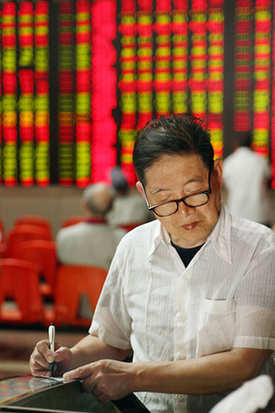|

|
|
An investor monitors stock prices at a securities company's outlet in Shanghai. [Shanghai Daily]
|
Shanghai is sparing no effort in the drive to upgrade its capital markets as an integral part of the city's ambitions to transform itself into an international financial center by 2020.
Shanghai Vice Mayor Tu Guangshao, in a recent interview, called for the world's sixth-biggest stock exchange to become a more open market. The Shanghai Stock Exchange is already proceeding with the establishment of an international board that will eventually allow foreign companies to sell yuan-denominated shares for the first time.
"The board is expected to be launched next year," Tu said.
Two years ago, China began work on the board as a means of enhancing the status of the exchange. The program has proceeded slowly amid local investor concerns about a potential stock glut that would adversely affect share prices.
The importance of the project was underscored again in March when the State Council, China's Cabinet, issued guidelines for the sale of stocks and bonds in Shanghai by overseas companies. Hong Kong-based Hang Seng Bank, the Bank of East Asia and Procter & Gamble are among the companies that have publicly expressed an interest in listing shares in Shanghai.
The Shanghai bourse also has pledged to offer new products to help the city achieve its goal to become an international financial center. "A successful international financial center can't be built without an international equities market that should comprise a top stock exchange, world-leading financial institutions, various financial services and innovative financial products to lure institutional investors," according to a statement from the exchange.
Boost cooperation
The bourse also plans to launch more cross-border financial products and beef up cooperation with overseas counterparts.
"We hope the Shanghai Stock Exchange can let people buy financial products from all over the world through cross-border trading arrangements, which will make the city one of the global asset-pricing centers," said Zhang Yujun, president of the bourse.
"Although we have solid hardware systems and our development is fast, we can still learn from overseas on how to become a globalized stock exchange," he said.
The exchange also plans to launch a new-generation trading system, enhance the development of the blue chip market, encourage mergers between listed companies, promote the bond market and block-trading system as well as develop exchange-traded funds.
"We will continue to develop ETFs based on overseas equity indices." Zhang said. "All our efforts are aimed at allowing investors to better allocate their assets."
ICBC Credit Suisse Asset Management Co on July 20 launched an ETF based on state-owned enterprises under the management of the central government.
It is an asset management joint venture formed by the Industrial and Commercial Bank of China Co Ltd, Credit Suisse and China Ocean Shipping (Group) Co.
The ETF, which enables investors to buy or sell shares in an entire benchmark portfolio, tracks an index comprising 50 state-owned enterprises on the Shanghai exchange.
"ETFs are among the most successful products across the world, accounting for large sums of net capital inflows even during the global financial crisis last year, when global assets depreciated sharply," said Liu Xiaodong, vice general manager of the Shanghai bourse.
Big ETF market
However, only five ETFs, with total assets of 23.2 billion yuan (US$3.39 billion), were listed on the Chinese mainland by the end of 2008.
Liu said the ETF market in China is still growing, and he forecast there would be many ETF products eying a listing in the near future.
The Shanghai bourse will deepen cooperation with its Hong Kong counterpart to list ETFs here based on the Hang Seng Index, Hang Seng China Enterprises Index and Hang Seng China-Affiliated Corporation Index, according to a guideline issued by the Shanghai government. No timetable was given.
The China Securities Regulatory Commission in June introduced a new IPO pricing system which favors smaller investors to create a fairer trading environment in equities.
Under the new rules, institutional investors will no longer be able to participate in the retail tranches of IPOs.In China, the new stock sale process is divided into "off-line" and "online" subscriptions. Under the old rules, institutional investors bid for a tranche of the IPO and fixed the stock price during the off-line subscription period. Then the same cash-rich institutions were allowed to participate in the online subscription which were also opened to individuals. That made it difficult for smaller, individual investors to buy stocks.
(Shanghai Daily August 5, 2009)